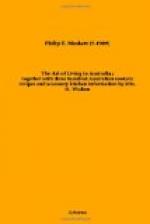When the muscles are put into action, what is termed their contractility is called into play—that is, the force which was dormant before is roused into activity. This is effected through the nervous system, and it is the will which emanates from the brain and is carried along certain nerves to accomplish definite actions. During the contraction of a muscle its individual fibres change in form, producing an alteration in the shape of the whole muscle; thus it becomes shorter and thicker. At the same time, while it is in action more blood flows through it, hence we see that one of the beneficial effects of exercise is to stimulate the circulation through the muscular system. It has also been ascertained by experiments, that the venous blood which comes from a muscle in action is darker in colour than that from a muscle in repose. When the circulation is quickened by movement, and the blood stream hastened, the vigour of the body is increased, because the used up material is all the quicker taken away, and a freshly created supply of nutrition brought to every part.
The rate of breathing is accelerated whenever the body is engaged in muscular exertion, and with this quickened breathing there is an increased amount of oxygen drawn in, and an increased amount of carbonic acid gas and water exhaled by the breath. The oxygen which is absorbed from the air into the blood is stored in the red corpuscles of the latter, by which it is carried to every part of the body. The venous blood which returns from every portion of the system comes back as a dark crimson, instead of being bright scarlet like the arterial blood. It contains carbonic acid, and returns it to the lungs, where it is exhaled by the breath. The oxygen is necessary to existence, while the carbonic acid is injurious. The effect of exercise, then, in any form, is thus to distribute healthy blood more rapidly through the system, while it removes the injurious matters quite as speedily. The effect of active exercise on the heart, as it is well known, is to make it beat faster; by this the blood is driven through the body at a quicker rate than usual. Sometimes, when the effort is unusually severe, there is a disturbance of the regular balance between the heart and the lungs. There is thus produced an irregular or unequal action of the former, causing what is known as “loss of wind,” which is, however, soon restored by resting.
There is an excessive flow of blood to the surface of the body, causing it to redden, and at the same time the perspiration is greatly increased. It is on account of this latter moisture opening up the pores of the skin that the good effects of exercise are chiefly due. The perspiration consists mainly of water containing different salts and organic matters. It is found by experiment that the amount of water passing through the lungs and skin is usually doubled even with moderate exertion.




